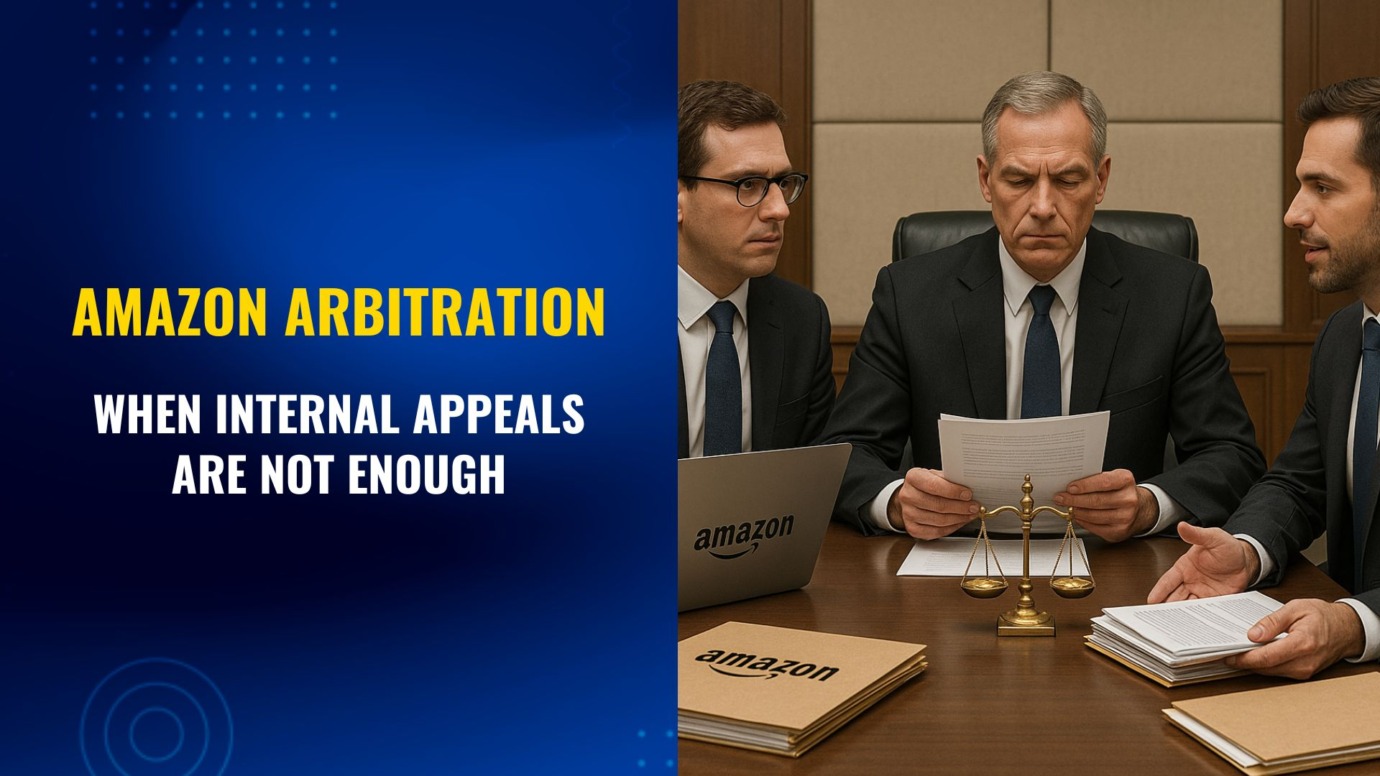
Book a FREE 15-minute consultation with an expert – Book Now
Amazon Arbitration: How It Works and Important Tips

Arbitration with Amazon is a legal pathway that operates independently of Seller Performance teams and may provide recourse when standard appeals have been exhausted.
If you’re facing account suspension, fund withholding, or repeated rejection of valid documentation through Amazon’s internal systems, understanding your arbitration rights under the Business Solutions Agreement becomes critical to protecting your business interests.
Most sellers are unaware that their BSA includes provisions that extend beyond Amazon’s internal appeals process. When Seller Performance continues rejecting documentation without a clear explanation, when appeals receive only templated responses, or when the internal process feels like an endless cycle of automated replies, arbitration may offer the independent review that internal channels cannot provide.
Our legal team has handled numerous Amazon-related arbitration cases, providing us with a practical understanding of how these proceedings work in real-life scenarios and what strategies are most effective in presenting a seller’s case.
Understanding Amazon’s Arbitration Framework
Amazon’s Business Solutions Agreement includes a mandatory arbitration clause that, with a few limited exceptions, requires sellers to resolve disputes through arbitration rather than in court. As a result, most Amazon sellers cannot sue in court, even in cases involving serious commercial harm.
While this initially appears restrictive, arbitration operates differently than Amazon’s internal processes. It’s administered through the American Arbitration Association (AAA), involves neutral arbitrators who review evidence independently, and typically resolves faster than traditional litigation (which can extend for years).
The process includes one significant limitation: most arbitrations against Amazon are subject to strict confidentiality provisions. This lack of transparency usually serves Amazon’s interests and creates information disadvantages for sellers, who cannot access insights from previous cases or proven strategies.
When Should Amazon Sellers Consider Arbitration?
Understanding when arbitration makes sense requires recognizing the realities of your seller relationship with Amazon. Under the BSA, Amazon does not need a cause to suspend or terminate seller accounts. The platform can end business relationships at any time, for any reason, or no reason at all.
However, sellers retain important rights. While arbitrators generally will not order Amazon to continue an at-will business relationship (meaning account reinstatement is rarely mandated), you can challenge how Amazon exercised its discretion, particularly when their conduct was unfair, disproportionate, arbitrary, or unreasonable.
Common Issues That Lead Sellers to Arbitration:
- Repeated rejection of valid documentation without specific guidance on deficiencies
- Vague or unsupported accusations that lack detailed explanations of alleged violations
- Excessive delays or unexplained silence during critical review periods
- Punitive or unjustified withholding of funds beyond reasonable business protections
- Denial of meaningful opportunity to respond to allegations or provide clarifying information
Arbitration is often the only mechanism for engaging Amazon’s legal team directly and escalating matters that internal teams have been unable or unwilling to resolve through standard channels.

Setting Realistic Expectations About Outcomes
Understanding what arbitration can and cannot achieve is crucial for making informed decisions about this legal process.
Account reinstatement is unlikely to be ordered as a remedy, due to the at-will nature of Amazon’s agreement. However, the fact that Amazon can end relationships at any time does not give the platform unlimited power to act inappropriately during the business relationship.
Amazon is still expected to act in a fair and commercially reasonable manner. Amazon is not allowed to impose penalties; for example, withholding seller funds cannot be used as punishment or leverage. Fund retention must reflect a reasonable prediction of Amazon’s actual potential harm, not serve as a coercive tactic.
Importantly, the at-will clause does not excuse prior procedural failures. It doesn’t eliminate accountability for harm caused by unreasonable delays, arbitrary decision-making, or mishandled appeals that occurred before account termination.
Filing for arbitration often leads to something sellers rarely achieve through internal channels: substantive dialogue with Amazon’s legal team and, in many cases, the beginning of serious efforts to reach resolution.
The Arbitration Process: Step by Step
Filing Your Claim
Arbitration is initiated through the American Arbitration Association (AAA). You file a demand for arbitration and pay a filing fee based on the amount of relief you’re seeking. These fees are typically paid in two or three installments, depending on your preference. Total filing costs can reach several thousand dollars, depending on the size and complexity of your claim.
Arbitrator Selection
After the initial filing, both parties receive a list of 10 potential arbitrators, along with their professional backgrounds. Each side ranks preferred arbitrators and strikes unacceptable choices. The AAA then selects the arbitrator based on these mutual rankings.
Once an arbitrator is selected, both parties split the arbitrator’s hourly fee, which ranges from $400 to $1,000 per hour, depending on the arbitrator’s experience and expertise.
Amazon’s Response
Amazon typically appoints internal or external legal counsel to handle their response to your arbitration demand.
Resolution Process
The matter may be resolved early through negotiation or proceed to a formal hearing, which is generally conducted via video conference. The process is confidential and typically spans several months. Most cases settle before reaching a final arbitrator ruling.
The Importance of Legal Representation
Arbitration involves complex procedural rules, evidentiary standards, and strategic considerations that are typically unfamiliar to sellers who haven’t navigated this process before. Amazon is represented by experienced in-house or external counsel, creating inherent advantages in these proceedings.
Engaging qualified legal counsel helps ensure that your claims are clearly articulated, properly supported with evidence, and aligned with relevant contractual and procedural requirements. While outcomes vary based on the specific facts of each case, legal representation can significantly improve the clarity, structure, and impact of your position, especially when facing a large and well-resourced opponent.
Making the Decision to Proceed
Arbitration isn’t appropriate for every seller dispute, and success depends heavily on the specific circumstances of your case. The process requires substantial investment of time and money, with no guaranteed outcomes.
Consider arbitration when:
- Internal Amazon appeals have been genuinely exhausted without a reasonable resolution
- You have documented evidence of procedural failures or unreasonable conduct by Amazon
- The financial impact justifies the costs and time investment of formal legal proceedings
- You have a clear understanding of what you hope to achieve beyond account reinstatement
Arbitration may not be worthwhile when:
- Standard appeals processes haven’t been fully utilized
- The underlying policy violation appears straightforward and justified
- The potential costs exceed the realistic benefits
- Your documentation doesn’t clearly support claims of procedural unfairness
What No One Tells You About Amazon Arbitration
Amazon arbitration provides a legal mechanism for addressing disputes that cannot be resolved through internal channels. While it doesn’t guarantee account reinstatement, it offers something that standard appeals rarely provide: independent review of your case by a neutral party and meaningful engagement with Amazon’s legal decision-makers.
The process requires careful preparation, realistic expectations, and professional legal guidance. For sellers facing significant financial harm from account suspensions, fund withholding, or documented procedural failures, arbitration may represent the most viable path to fair resolution.
Before proceeding, document all interactions with Amazon thoroughly, identify specific instances of procedural unfairness or unreasonable conduct, and honestly assess whether your situation involves the type of systemic problems that arbitration is designed to address.
Contact us for an initial discussion to understand your options and determine whether arbitration is the right step forward.
*This article provides general information about Amazon arbitration and should not be considered legal advice. Individual outcomes depend on specific case facts and circumstances. Consult qualified legal counsel for advice regarding your particular situation.
FAQ
What is Amazon arbitration?
Amazon arbitration is a formal legal process outlined in the Business Solutions Agreement (BSA) that allows sellers to resolve disputes with Amazon outside of its internal appeal system. Instead of Seller Performance or internal teams making the final call, an independent arbitrator reviews the evidence and makes a binding decision.
When should I consider arbitration with Amazon?
You might consider arbitration if you’ve exhausted all standard Amazon appeal options without resolution, and you have documented evidence of unfair treatment, excessive delays, or unreasonable fund withholding. It’s most often used in high-impact cases where the financial loss or business harm justifies the time and cost involved.
Can arbitration get my Amazon account reinstated?
While account reinstatement is possible, it’s rare. Arbitration can’t force Amazon to continue doing business with you due to the at-will nature of the BSA. However, it can address procedural failures, secure the release of withheld funds, or hold Amazon accountable for unfair or disproportionate actions.
How long does the Amazon arbitration process take?
Most cases take several months from filing to resolution, though some settle earlier through negotiation. The process involves filing a claim with the American Arbitration Association, selecting an arbitrator, exchanging evidence, and sometimes participating in a hearing (often by video conference).
Do I need a lawyer for Amazon arbitration?
Technically, you can represent yourself, but Amazon is always represented by experienced in-house or external counsel. Arbitration has strict procedural rules and requires well-documented claims, so professional legal representation can significantly improve your chances of presenting a strong, well-structured case.
Legal Disclaimer: The articles published on our platform are for informational purposes only and do not constitute legal advice in any form. They are not intended to be a substitute for professional legal counsel. For any legal matters, it is essential to consult with us or a qualified attorney who can provide advice tailored to your specific situation. Reliance on any information provided in these articles is solely at your own risk.
Amazon Brand Registry – Discover for Free if You’re Eligible
Increase Your Chance of Getting a
Trademark to 96%
Subscribe to Our Newsletter
Sign up to receive valuable information on E-Commerce and intellectual property

